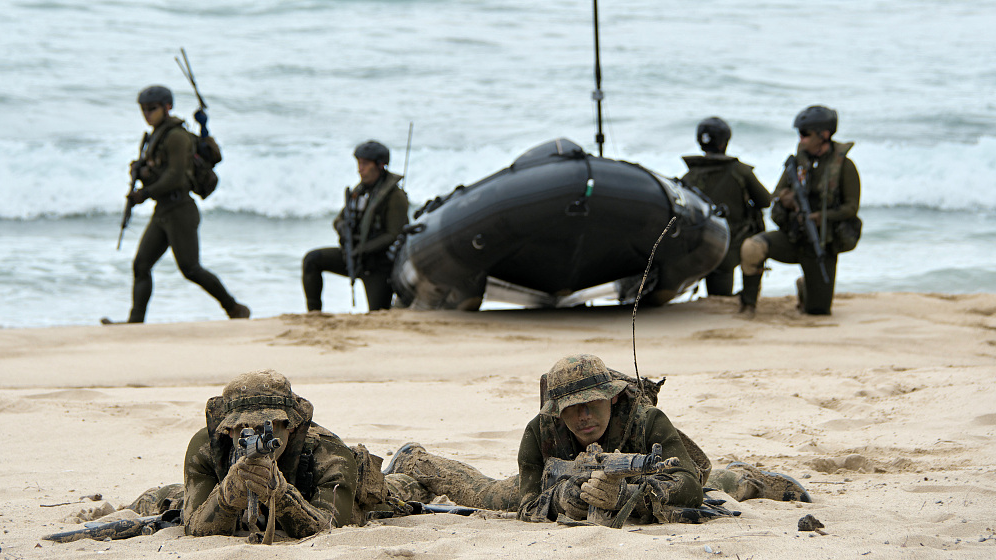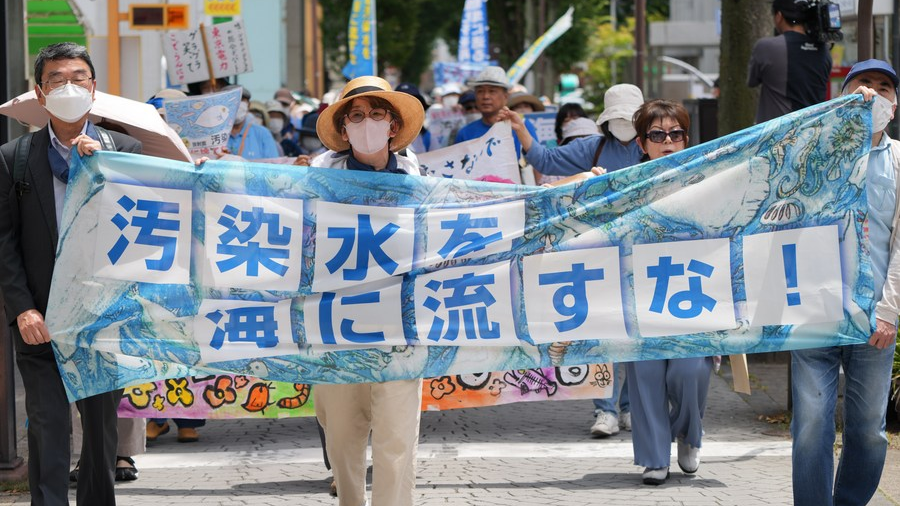Today marks the 78th anniversary of the Japanese government's unconditional surrender – a victory of the anti-fascist war of the people all over the world. However, experts warned that Japan did not learn from the failure and instead it continues to heighten regional tensions.
From the Nanjing Massacre to the notorious bacterial experiment of Unit 731 and "comfort women" system, the Japanese soldiers have committed countless atrocities in China and other Asian countries.
In recent years, however, the Japanese government has attempted to deny its history of aggression. While the entire history of the war of aggression against China has been erased in Japan's right-wing-led publishers such as Ikuhosha, the right-wing politicians, including some prime ministers and cabinet ministers, have openly visited the Yasukuni Shrine, which honors Class A war criminals of World War II.
What's more, it has also attempted to increase military spending, build up military strength and seek to breakthrough its pacifist constitution.

Members of Japan Ground Self-Defense Force's Amphibious Rapid Deployment Brigade land during the joint military exercise with U.S. Marines at Manda Beach in Tokunoshima Island, Kagoshima Prefecture, Japan, March 3, 2023. /CFP
Members of Japan Ground Self-Defense Force's Amphibious Rapid Deployment Brigade land during the joint military exercise with U.S. Marines at Manda Beach in Tokunoshima Island, Kagoshima Prefecture, Japan, March 3, 2023. /CFP
Accelerate military expansion
In March 2023, the Japanese parliament enacted a record 114.38 trillion yen ($874.77 billion) budget for fiscal 2023, including a record 6.82 trillion yen in defense spending, which marked a 20 percent hike and the highest on record.
Restricted by the Peace Clause of Japan's constitution, Japan's defense spending has been kept at no more than one percent of GDP for decades. But this limit will not work.
Japanese Prime Minister Fumio Kishida has pledged to raise national defense spending to a total of 43 trillion yen over the next years, bringing the annual budget to 2 percent of the gross domestic product in the fiscal year.
The Japanese government last December decided to update three security and defense-related documents including the National Security Strategy – a significant change to its post-war security policies.
The documents greenlighted by Kishida's cabinet seek to acquire the attack capability against the enemy bases, break the constraints of the pacifist Constitution and the commitment to "exclusively defense-oriented policy."
The documents also proposed to revise the "Three Principles of defense equipment transfers" – which replaced the "Three Principles of Arms export" prohibiting Japan from exporting weapons, trying to significantly relax the restrictions on arms export.
Noting the documents could foment an arms race in east Asia, Atsushi Koketsu, emeritus professor at Yamaguchi University of Japan, said that the documents will heighten tensions between Japan and its Asian neighbors.
The Kishida government has also actively expanded multilateral military cooperation. Besides building the Quad mechanism and defense alliance with U.S. and South Korea, Japan has also engaged NATO countries in Asia-Pacific affairs, including holding joint military exercised with NATO countries in the Asia-Pacific region.
In 2022, Kishida became the first Japanese prime minister to join a NATO summit, and this year, he is reported to attend the NATO Summit in November.
Japan's move to approach NATO and create tension in the Asian region violates its commitment to China when the two countries signed the China-Japan Treaty of Peace and Friendship 45 years ago, Koketsu added.

People protest against the Japanese government's plan to discharge nuclear-contaminated water into the sea in Fukushima, Japan, June 20, 2023. /Xinhua
People protest against the Japanese government's plan to discharge nuclear-contaminated water into the sea in Fukushima, Japan, June 20, 2023. /Xinhua
Discharge Fukushima waste water despite opposition
Another thing makes Japan become target of international criticism is its insistence on pushing for the release of the radioactive wastewater from the Fukushima nuclear power plant hit by a massive earthquake and an ensuing tsunami in March 2011.
Hit by the magnitude-9.0 earthquake and tsunami, the Fukushima Daiichi nuclear power plant suffered core meltdowns that released radiation, resulting in a level-7 nuclear accident, the highest on the international Nuclear and Radiological Event Scale, and becoming the worst nuclear disaster after the Chernobyl accident.
Despite strong opposition from neighboring and Pacific island countries, as well as local fishermen over the irreversible impacts on the marine environment and public health, Japan is mulling discharge of Fukushima waste water into the sea beginning in between late August and early September.
Noting the Japanese government and TEPCO chose the cheapest method of treating nuclear-contaminated wastewater, Hideyuki Ban, co-director of the Tokyo-based Citizens' Nuclear Information Center, believes there are other less polluting ways of treating the radioactive wastewater, such as mortar solidification, that are more practical than dumping it into the sea.
Ban also warned if fish and shellfish are contaminated, it will ultimately affect the health of humans who are at the top of the food chain.
(With input from Xinhua)